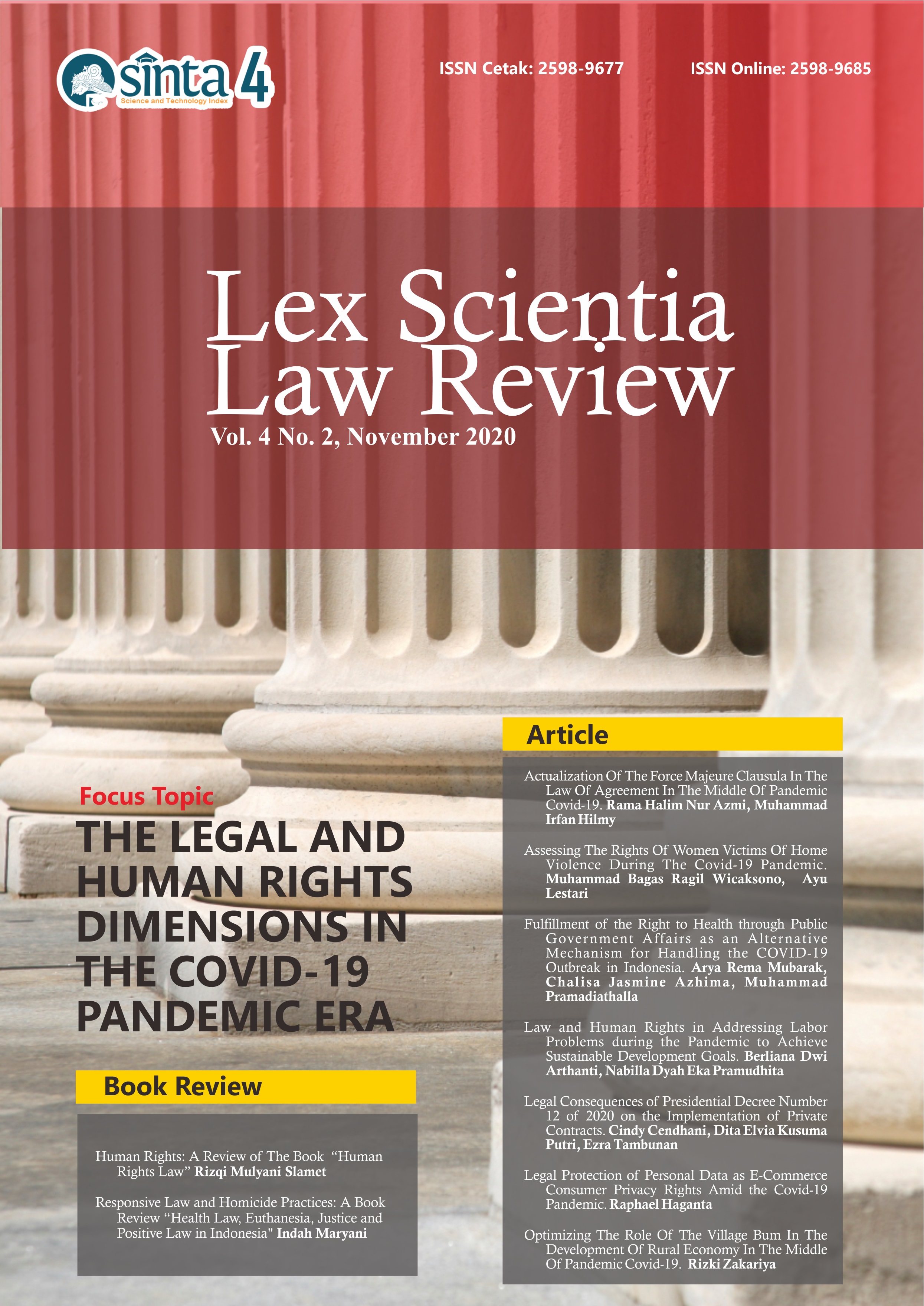Actualization of the Force Majeure Clausula in the Law of Agreement in the Middle of Pandemic COVID-19
Main Article Content
Abstract
As the governing body for social life, the existence of law cannot just be released. The importance of law in human life is solely for creating justice and order. One of the essences of the law itself is that there are rules for the relationship between the state and its people and between individuals. In general, laws that regulate relationships between individuals in society are civil laws. In civil law, there are several scopes including agreement. An agreement is essentially an agreement between the parties which then creates a legal relationship between the parties. However, in its application, there are several reasons that can be used by either party for not fulfilling its achievement. One of the reasons for this is force majeure or better known as a state of force. In general, the state of force is only synonymous with natural disasters or the act of God. But now the scope of force majeure has expanded in practice. Currently, almost all countries in the world are being hit by the COVID-19 pandemic. This pandemic condition certainly affects all aspects of life, including the enforcement of an agreement. Through this paper the author will discuss the conception of force majeure and how it correlates with the current pandemic situation. The method used in this paper is normative juridical approach to laws and regulations, conceptual approaches, and case approaches.
Article Details
All writings published in this journal are personal views of the authors and do not represent the view of this journal and the author's affiliated institutions. Authors retain the copyrights under this license, see our copyrights notice.
References
Anonim. (2011). Force Majeure in Troubled Times: The Example of Libya. Houston: Jones Day Publication.
B., S. (n.d.). Karakter Penelitian Hukum Normatif dan Sosiologis. Yogyakarta: Puskumbangsi LEPPA UGM.
Badrulzaman, M.D., et al. (2001). Kompilasi Hukum Perikatan. Bandung: PT Citra Aditya Bakti.
Bastiat, F. (2010). Hukum Rancangan Klasik untuk Membangun Masyarakat. Merdeka. Jakarta: Freedom Institute.
Harahap, M. Y. (1986). Segi-Segi Hukum Perjanjian. Bandung: Alumni
Marzuki, P. M. (2005). Penelitian Hukum. Jakarta: Kencana.
Satrio, J. (2001). Hukum Perikatan-Perikatan Yang Lahir Dari Perjanjian. Bandung: PT. Citra Aditya Bakti
Simanjuntak, P. N. H. (2017). Hukum Perdata Indonesia Cetakan ke- 3. Jakarta: Kencana.
Soebekti, R. (1992). Aspek-Aspek Hukum Perikatan Nasional. Bandung: PT. Citra Aditya Bakti.
Soemadipradja, R. S. S. (2010). Penjelasan Hukum tentang Keadaan Memaksa. Jakarta: Nasional Legal Reform Program-Gramedia
Soemitro, R. H. (1988). Metodologi Penelitian Hukum dan Jurimetri. Jakarta: Ghalia Indonesia.
Suadi, H. A. (2018). Penyelesaian Sengketa Ekonomi Syariah: Penemuan dan Kaidah Hukum. Jakarta: Prenamedia Group.
Widnjoesoebroto, S. (2002). Hukum, Paradigma, Metode, dan Dinamika Masalahnya. Jakarta: ELSAM-HUMA.
Zoller, E. (2008). Introduction to Public Law: a Comparative Study. Leiden: Martinus Nijhoff Publishers.
Journal:
Bishoff, T. S. & Miller, J. R. (2009). Force Majeure and Commercial Impractiability: Issues to Consider Before the Next Hurricane or Matural Disaster Hits. The Michigan Bussiness Law Journal, 1(1).
Honigsbaum, M. (2009). Historical Keyword Pandemic. The Lancet, 1939.
Isradjuningtyas, A. C. (2015). Force Majeure (Overmacht) Dalam Hukum Kontrak (Perjanjian) Indonesia. Veritas Et Justitia, 1(1).
Kelly, H. (2011). The Classical Definition of a Pandemic is Not Elusive. Bulletin of World Health Organization.
Prasetianingsih, R. (2014). Konstitusionalisasi Hukum Privat: Beberapa Pandangan yang Berkembang dalam Pengkajian Ilmu Hukum. Padjadjaran Jurnal Ilmu Hukum, 1(2).
Purwanto, H. (2011). Keberadaan Asas Rebus Sic Stantibus Dalam Perjanjian Internasional. Jurnal Mimbar Hukum Edisi Khusus.
Qiu, W., Rutherford, S., Mao, A., & Chu, C. (2017). The Pandemic and Its Impact. Health, Culture, and Society, 9–10.
Online/World Wide Web:
BPS. Ekonomi Indonesia Triwulan II 2020 Turun 5,32 Persen. Available From https://www.bps.go.id/pressrelease/2020/08/05/1737/-ekonomiindonesia-triwulan-ii-2020-turun-5-32-persen.html. (Accessed on 12 September 2020)
Clifford Krauss, Chesapeake Energy, a Shale Pioneer, Files fot Bankruptcy Protection, https://www.nytimes.com/2020/06/28/business/economy/chesapeake-energybankruptcy.html. (Accessed on 12 September 2020)
CNN Indonesia. Resesi AS, Puluhan Perusahaan Kakap Ajukan Pailit. Available From https://www.cnnindonesia.com/ekonomi/20200913113937-92-545834/resesi-as-puluhan-perusahaan-kakap-ajukan-pailit. (Accessed on 12 September 2020)
Shearman. Covid 19: Force Majeure Event?. Available From https://www.shearman.com/perspectives/2020/03/covid-19--forcemajeure-event. Accessed on 12 September 2020).
UNICEF. Frequently Asked Questions about coronavirus disease (COVID-19). Available from https://www.unicef.org/indonesia/coronavirus/FAQ. (Accessed on 10 Oktober 2020).
